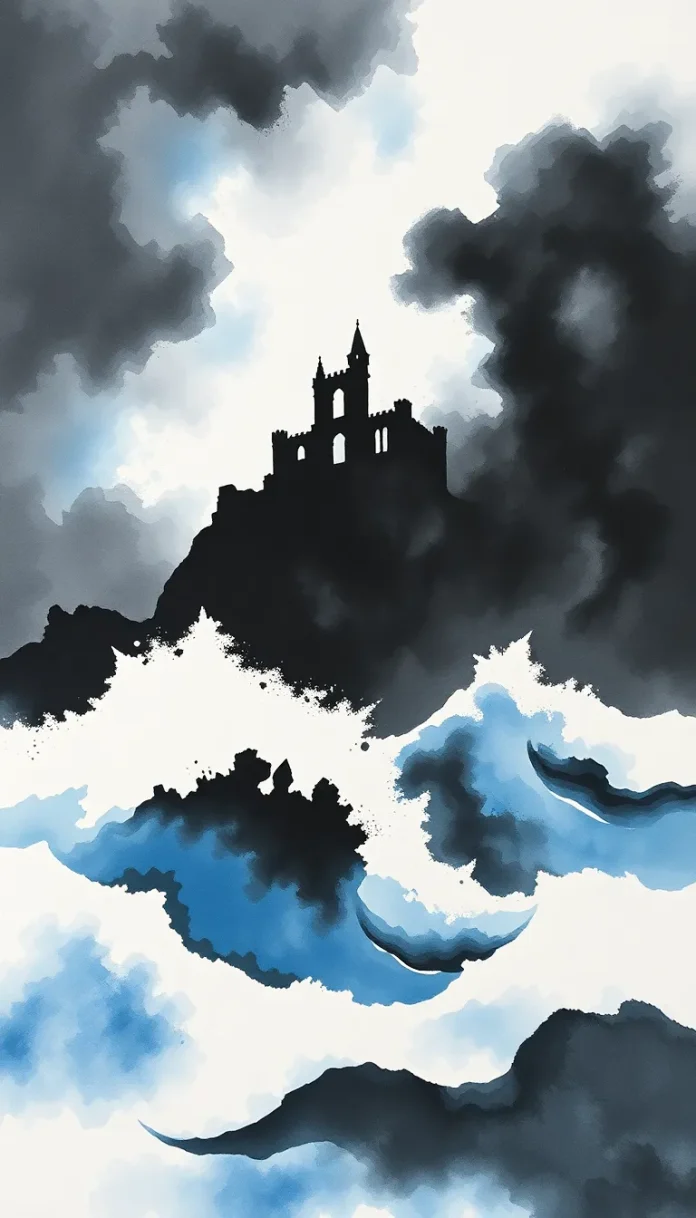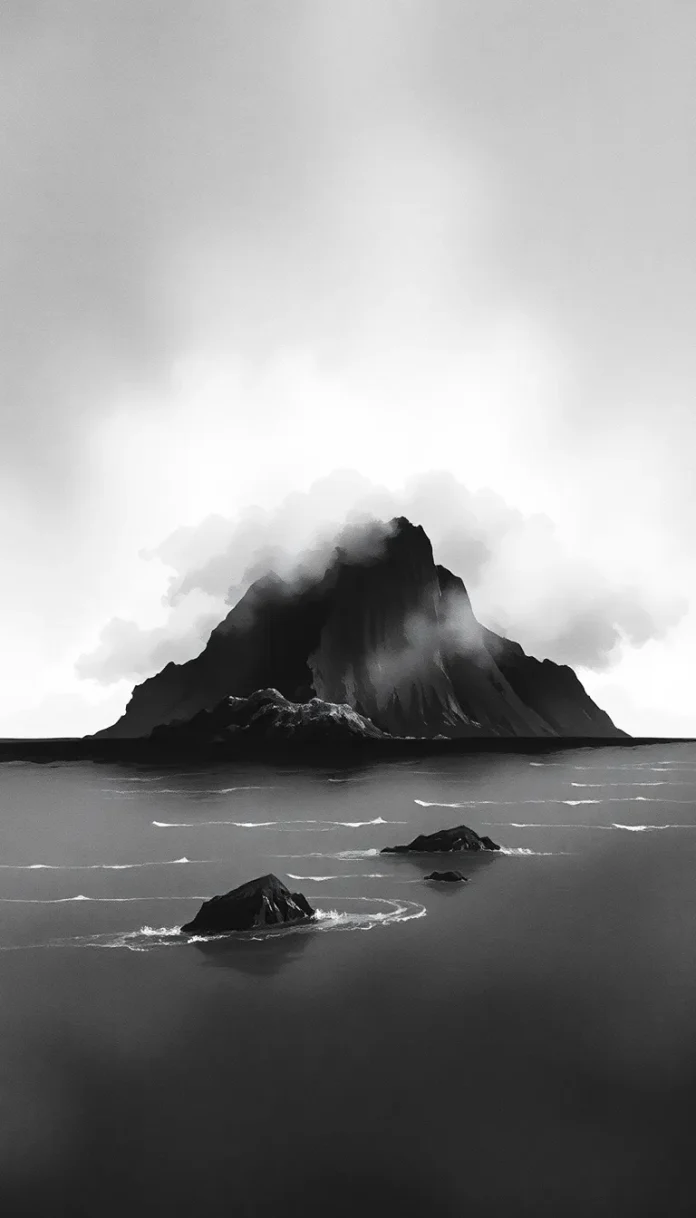The Fateful Muse of the Temple
A painter sought the whispers of a long-lost boon;
Within an ancient temple, ruin’d yet profound,
He chased the ghost of beauty on cold, sacred ground.
Beneath the arches steeped with time’s enduring lore,
Our artist roamed in wonder o’er each crumbling door;
His heart enkindled by dreams that time could not restrain,
In search of love’s elusive spark beyond all mortal bane.
He, Alaric—a soul starved for romantic art—
Did wander through the hallowed vestiges of his heart,
And in the still, enchanted hush of that old shrine,
An apparition fair, ineffable, did shine.
Her name was Elysia, spirit carved in rarest grace,
A muse, ethereal vision with sorrow in her face;
Though but a spectral shadow, she in beauty reigned,
In every sunken echo, her memory was sustained.
“Come hither,” whispered wind through columns dressed in moss,
“Find solace in the silence midst this ancient dross.”
So Alaric, his brush in hand, with trembling, fervent plea,
Longed to capture that divinity he dared not dare to see.
His eyes, like pools of ardour deep with wistful grace,
Saw her reflection lingering on each time-worn place;
Windows to a soul that yearned to break the chains
Of mortal drawback, yearning for eternal strains.
In vaulted halls of stone, where shadows’ secrets dwell,
He found his inspiration in a mystic, mournful swell;
For every faded fresco, every tear in crumbling wall,
Sang bittersweet requiems of fate’s most harsh call.
With each brushstroke tender, painting light with shades of grief,
He sought to bind her essence in a frame of brief relief;
Yet, try as he might, he soon discerned the painful truths
That love, when forged in desolation, only sows fond ruths.
For Elysia, the muse of an unattainable desire,
Was bound to that forlorn temple by a ghostly fire;
Her love, as fleeting as the twilight’s gentle kiss,
Promised no embrace of warmth—no mortal bliss.
“Art thou but memory?” the painter softly cried,
Facing her ephemeral form that ne’er could be denied;
Her eyes, like orbs of moonlight, shimmered bright and pale,
And answered in a murm’ring sigh—both lament and tale.
In whispered, measured tones beneath the temple’s dome,
She said, “I am no mortal bride, but the ghost of time and home;
For I exist in every verse of sorrow and of grace,
A phantom bound to longing in this desolate place.”
Day by day, he toiled in quest of that eternal hue,
Capturing fragments of her glow in shades of mourning blue;
Tiresome hours wove into nights that dreamed of fate,
And weeks dissolved as if by wind, swallowed by the weight.
The painter’s heart, a vessel fragile and unsealed,
Bore witness to the tragic truth that never could be healed;
For love, though blooming like a rose in deepest night,
Must wither ‘neath the sun’s harsh glare—a doomed delight.
Within the temple’s echoing, time-forgotten hall,
Her voice would call his name in every ancient wall;
“Remember me, dear painter, though love’s flame may oppose
The endless tide of fate that through forgotten ages flows.”
So, in the gloom of that grand ruin’d sanctum’s keep,
He laboured with his art while Elysia would weep,
A spectral lament rising from the cold, cracked stone,
In every lonely corner, in every sigh, alone.
As seasons passed in silent grief and fervent dream,
The temple’s halls grew sorrowful beneath an endless stream
Of tears and memories—each brushstroke served to bind
The painter’s mortal aspirations to a love he’d never find.
In the mirror’d pools of ancient stone he saw his face
Reflected in the teardrop glimmer of a lost embrace;
Yet, each reflection etched in light recalled the fleeting time
When Elysia’s spectral grace had danced within his rhyme.
“Art is but a fleeting flame,” the painter oft declared,
“To capture love’s pure essence, one must both bleed and dare.”
Yet, in his heart, the truth was harsh: No art can ever mend
The ravaged path of longing, nor a broken fate upend.
One fateful eve, beneath a tempest’s dark decree,
When tempests raged around the temple’s ancient entry,
Alaric, bent by woeful truth, resolved at last to try
To seize that love ephemeral—aware ‘twas doomed to die.
He gathered all his paints and oils, his heart aflame,
And in a final, desperate bid, bestowed upon her name
His masterpiece—a portrait wrought with sorrow’s deep despair,
A vision of Elysia rendered with that trembling care.
By candle’s glow and flickering shadows on the wall,
He laboured with a fervor that would not let his spirit fall;
Each line was etched with anguish, each hue imbued with pain,
For in those painted strokes he sought to bind her silent reign.
“Elysia, my heart’s own ghost,” he softly did implore,
“Let not the laurels of our love be scattered evermore.
If death is but a doorway to a still and higher art,
Then let my soul be thine own, and join with mine, not part.”
Yet as the final stroke was laid upon the canvas white,
A dreadful shadow plunged the temple into endless night;
The ancient walls, once proud and steeped in whispered lore,
Now trembled as the echo of oblivion began to roar.
For in that final moment, as the painter’s vision died,
The temple, too, succumbed to time and fate allied;
The sacred stones beneath his feet did crumble into dust,
And Elysia’s whispered promise turned to sorrow, lost in rust.
In a swirl of dust and anguish, Alaric fell to his knees,
The masterpiece—a testament to love’s departed ease—
Slipped from his trembling fingers, mingling with the sand,
As the temple’s ancient spirit claimed its final, mournful stand.
“Why must the brightest love be bound to shadow’s art?”
He cried aloud in fervent grief, with anguish in his heart;
His voice, an echo of despair, did fade against the gale,
A requiem for dreams that time could not forever hail.
The celestial muse, her form now blurred by endless night,
Whispered, “All things must fade, dear soul, away from mortal sight.
Our love was ever fated to remain a fleeting grace,
A spark amid the darkness, swallowed by oblivion’s embrace.”
Thus was the painter’s quest—a journey wrought in wistful pain—
An ardent search for beauty lost, a love that none could sustain;
His brush, now idle and forlorn, lay broken at his feet,
A silent relic of the romance time was doomed to cheat.
In final hours, as life ebbed slow from his weary frame,
He gazed upon the ruins, as if to seek the ghost by name;
Alone within that crumbling crypt of passion and despair,
He felt his soul dissolve away in solitude so bare.
The wind did carry faint refrains of long-forgotten lore,
Of hearts entwined in ardent dreams that sorrow would restore;
Yet those dreams—like phantoms—vanished in the ceaseless tide
Of fate’s relentless march, no mortal love could e’er abide.
With one last wistful sigh, the painter’s eyes grew dim and cold,
His heart, once fierce with ardor, lay silent, tired, and old;
And in the final stroke of time, as darkness claimed his breath,
The lamp of hope was snuffed away, succumbing to its death.
So lies the tale of Alaric, whose love was never won,
Of Elysia, the muse eternal, beneath the setting sun;
Their union, fraught with beauty, carved deep in sorrow’s stone,
Remains a lamentation to the futile quest now known.
For in that ancient temple, where love found no reprieve,
A lesson lingers softly, for all who dare believe:
That beauty and desire, though destined to inspire,
May fade into oblivion—consumed by naught but fire.
The painter’s legacy lives on in echoes of the past,
A somber melody of joy and pain forever cast;
And every soul who wanders ‘neath the twilight’s ghostly beam
May feel that melancholy whisper of an impossible dream.
Thus ends this tragic narrative, a dirge for hearts undone,
In eloquent, eternal verses where bright love’s light was shunned;
Remember, dear reader, in life’s relentless, fleeting art,
That love, though sweet, must sometimes part, and leave a mournful heart.


